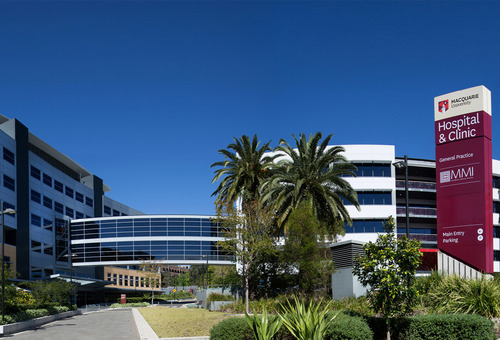- Our centres
- Macquarie University Hospital (Oncology)

Macquarie University Hospital (Oncology)
Hospital Building, Suite 1, Level B2, 3 Technology Place, Macquarie University, NSW, 2109, Australia
Overview
Centre leader

Lisa Gia
We are co-located with Macquarie University Hospital, and offer you access to our dedicated multidisciplinary team who strive to personalise the care experience from first visit through to post treatment.
Services
GenesisCare, Macquarie University Hospital offers access to evidence-based cancer care services including radiation therapy.
The GenesisCare centre, at Macquarie University Hospital is located on Level B2, and operates Monday-Friday from 7am-5pm.
The centre offers access to cancer care services including radiation therapy and allied health support. Our team is dedicated to offering personalised treatments delivered in a multidisciplinary care environment.
Care is managed by a passionate and supportive team of healthcare professionals with experience in oncology including: radiation oncologists, registered nurses, radiation therapists, physicists, and a dedicated team of support staff.
We aim to offer rapid access to consultation and treatment in a comfortable, modern, and relaxing environment.
Our treatments and services
Radiation oncology
Radiation therapy uses high energy X-rays or other particles to treat cancer and can be used at all stages. Radiation therapy techniques can include: External Beam Radiation Therapy (EBRT), Intensity Modulated Radiation Therapy (IMRT), Deep Inspiration Breath Hold (DIBH), Image Guided Radiation Therapy (IGRT), Stereotactic Ablative Radiation Therapy (SABR), LDR Brachytherapy, Gamma Knife Radiosurgery, fiducial markers, and specialised non-surgical treatment for skin cancer.
Allied Health Services
At GenesisCare, Macquarie University Hospital we offer you access to a range of Allied health services, all tailored to support your needs. One of your treatment team will discuss the most suitable options with you. Support services offered may include:
- Dietitian
- Speech Pathology
- Exercise Physiology
- Massage Therapy
- Lymphoedema Clinic
- Physiotherapy
- Psychology
- Encore Program
- Enrich Program
- Look Good Feel Better
- McGrath Nurse
- Prostate Cancer Foundation Nurse
- Pain and supportive care management
Exercise Therapy
Considerable research and clinical evidence has established that exercise may be beneficial for people with cancer; however, there is no one-size-fits-all approach.1,2 Every person’s circumstances are unique and these should be take into account. Tailored exercise programs designed by an exercise professional that include both aerobic and resistance training activities have been shown to provide benefits.3 To learn more about incorporating exercise during your cancer journey, please speak with your doctor and treatment team.
Parking is accessible on-site in the secure basement car park accessed by turning off Research Park Drive. Parking packages are provided during treatment.
Macquarie University train station and bus interchange are located two streets away on the corner of Herring Road and Waterloo Road.
- Campbell KL, Winters-Stone KM, Wiskemann J, et al. Exercise guidelines for cancer survivors: Consensus statement from international multidisciplinary roundtable. Med Sci Sports Exerc 2019;51(11):2375–2390.
- Hayes SC, Newton RU, Spence RR, et al. The Exercise and Sports Science Australia position statement: Exercise medicine in cancer management. J Sci Med Sport 2019;22(11):1175–1199.
- Buffart LM, Kalter J, Sweegers MG, et al. Effects and moderators of exercise on quality of life and physical function in patients with cancer: An individual patient data meta-analysis of 34 RCTs. Cancer Treat Rev 2017;52:91–104.
Disclaimer:
This website is provided for information purposes only. Nothing on this website is intended to be used as medical advice, or to diagnose, treat, cure or prevent any disease. It should not be used as a substitute for your own health professional's advice. Any medical procedure or treatment carries risks. Before proceeding with treatment, you should discuss the risks and benefits of the treatment with an appropriately qualified health practitioner. Individual treatment outcomes and experiences will vary.